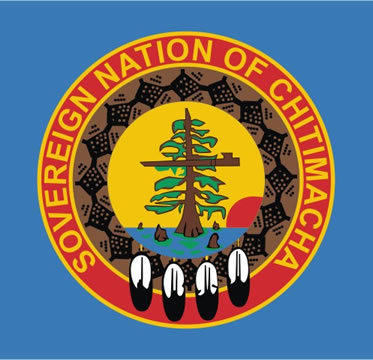 |
Canku Ota
|
 |
|
(Many Paths)
|
||
|
An Online Newsletter
Celebrating Native America
|
||
|
February 2013 - Volume
11 Number 2
|
||
|
|
||
|
Sleeping Language
Gets Help From Rosetta Stone
|
||
|
by Press Release Rosetta
Stone
|
||
 The
Chitimacha tribe on Louisiana's coast endured for century after century
— surviving war, settlement and assimilation. Its language did
not. The native tongue of the Chitimacha people disappeared, seemingly
forever, when its last two fluent speakers died in 1934 and in 1940.
One generation, then another, grew up not knowing the words of their
ancestors, the rich language of the bayous of the Mississippi Delta.
But now, with a curious mix of historical, scholarly and technological
effort, the language is being reborn. Rosetta Stone Inc., a global
language-learning software company, has agreed to subsidize software
development in the tribal tongue as part of its Endangered Language
Program. The
Chitimacha tribe on Louisiana's coast endured for century after century
— surviving war, settlement and assimilation. Its language did
not. The native tongue of the Chitimacha people disappeared, seemingly
forever, when its last two fluent speakers died in 1934 and in 1940.
One generation, then another, grew up not knowing the words of their
ancestors, the rich language of the bayous of the Mississippi Delta.
But now, with a curious mix of historical, scholarly and technological
effort, the language is being reborn. Rosetta Stone Inc., a global
language-learning software company, has agreed to subsidize software
development in the tribal tongue as part of its Endangered Language
Program.
"We want to bring the language back to the point where we can use it conversationally when we gather as a tribe," says Kimberly S. Walden, M.Ed., cultural director of the 1,000–member tribe. "Language is really the heart of who you are. It's not just about learning the words, it's about learning your past. It's that connection." Rosetta Stone Inc. is helping the tribe translate and record its award-winning software program into Sitimaxa, the language of the Chitimacha. When it's finished, the tribe will own the software and use it to assist ongoing educational programs for children and adults. Wax Cylinders
They found Dr. Julian Granberry, a linguist and anthropologist living in Florida with academic credentials and experience with Native American languages. Most incredible of all, they discovered that he'd worked with Swadesh as a high school sophomore and had taught himself to speak Sitimaxa, using research materials. Granberry, now 80, had been studying their native language for decades. "When Dr. Granberry spoke Sitimaxa to a group of Chitimacha elders assembled at a meeting, some of the elders began to cry," says Walden. "Words started coming back. They remembered." He and some members of the tribe threw themselves into the project. Dictionaries were created, classes formed, primers and recordings were shared. Instruction now starts at six weeks after birth at Yaamahana, the Chitimacha Child Development Center, and continues through eighth grade at the Chitimacha Tribal School. Adults who live on or near the reservation have access to night sessions. Rachel Vilcan was one of the first students in the adult class. Now she's an aide in the K-8 Sitimaxa program. "The language sounds natural; it sounds like it fits me, like it fits the area," Vilcan says. "It was scary, at first, to be learning it as an adult, but the desire was stronger. It's our identity." High-Tech Solutions From
Rosetta Stone "Our hope is that Sitimaxa Rosetta Stone software will be a tool that will make a difference in the vitality of the language of the Chitimacha tribe," says Marion Bittinger, manager, Rosetta Stone Endangered Language Program. "We look forward to working with the tribe to help realize their vision for a living and growing language." The software program will be translated into Sitimaxa, paired with audio recorded in the studio, and combined with Rosetta Stone elegant photography and some customized Chitimacha images. Ilse Ackerman, editor-in-chief at Rosetta Stone, says the ease of access will enhance language learning for the tribe. "It's wonderful to think about the multiplier effect," she says. "If you only have exposure to a few speakers, you are limited — but the software can change that, giving you access to the language around the clock and at long distances." The tribe has members as far away as Guam, Germany and Alaska who will be able to learn Chitimacha using CDs or online software when the project finishes. "I think the chances are very great that they will succeed," Granberry says. "There has been, for the last decade, a strong interest on the part of a large number of the tribal members. When the Rosetta Stone program works, which it will, this will be the first Native American language revived from zero." About Rosetta Stone Inc.
|
|
|
||
|
|
||
| Canku Ota is a free Newsletter celebrating Native America, its traditions and accomplishments . We do not provide subscriber or visitor names to anyone. Some articles presented in Canku Ota may contain copyright material. We have received appropriate permissions for republishing any articles. Material appearing here is distributed without profit or monetary gain to those who have expressed an interest. This is in accordance with Title 17 U.S.C. Section 107. | ||
|
Canku Ota is a copyright ©
2000 - 2013 of Vicki Williams Barry and Paul Barry.
|
||
 |
 |
|
|
The "Canku
Ota - A Newsletter Celebrating Native America" web site and
its design is the
|
||
|
Copyright ©
1999 - 2013 of Paul C. Barry.
|
||
|
All Rights Reserved.
|
||
